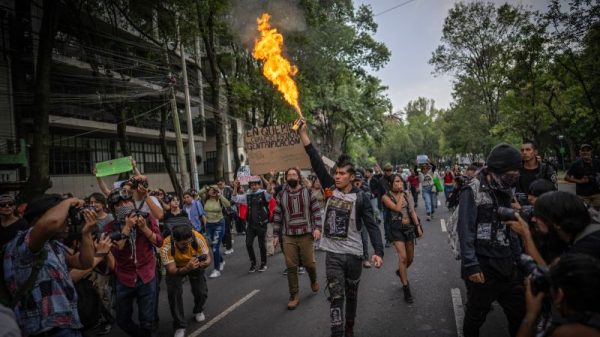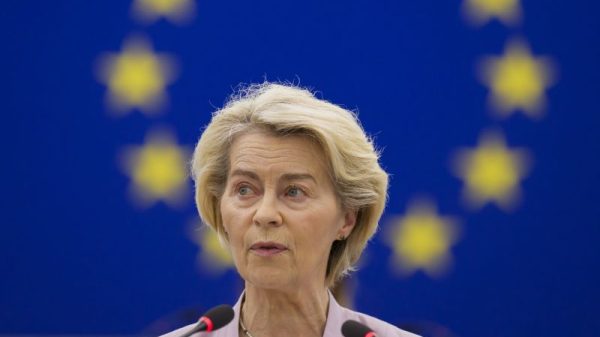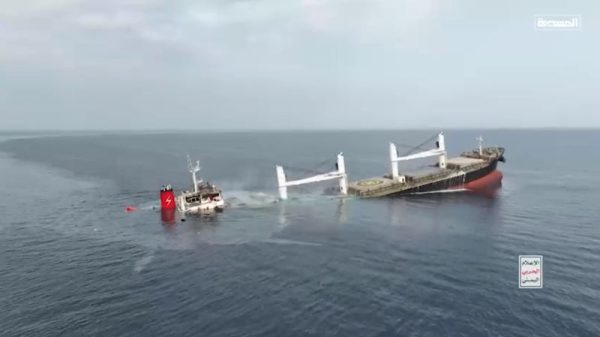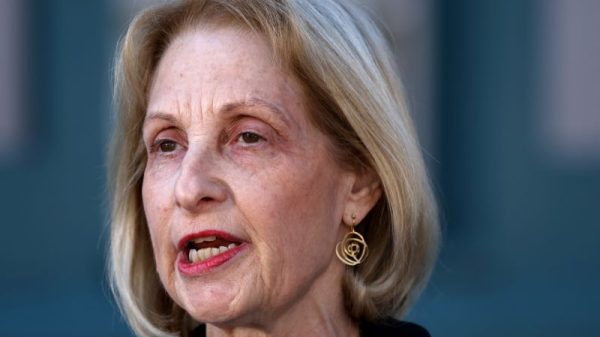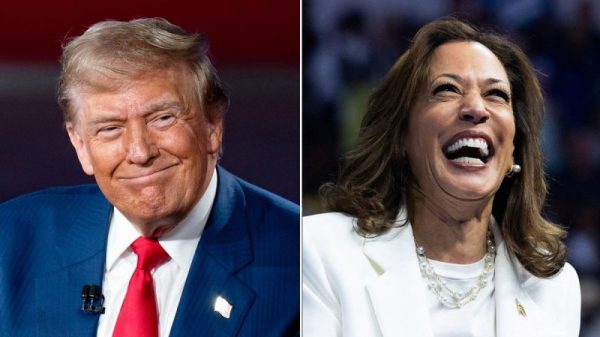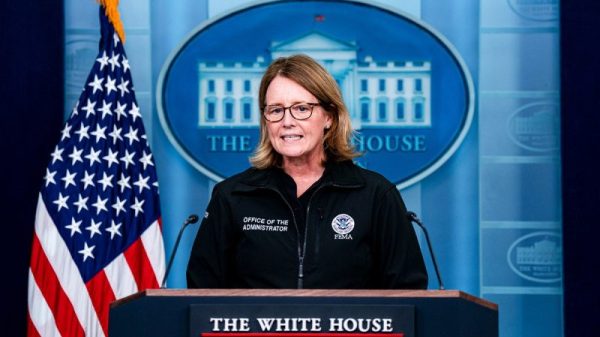Ursula von der Leyen has been reelected to a second five-year term as president of the European Commission after a vote by EU lawmakers, as the continent’s mainstream seeks to reassert itself in the face of a resurgent far right.
In an earlier pitch to the European parliament in Strasbourg, France, von der Leyen on Thursday pledged to invest in infrastructure and industry, create a new “European Defense Union” and stay the course on the continent’s green transition.
After a secret ballot, von der Leyen was reelected with 401 votes in favor and 284 against. She needed more than 360 ballots to secure a majority in the 720-seat parliament.
Von der Leyen, who led the commission through the Covid-19 pandemic and the beginning of Russia’s full-scale invasion of Ukraine, will now preside over a bloc that shifted rightward after last month’s European elections, when far-right parties won a record number of seats.
Addressing the parliament before the lunchtime vote, von der Leyen said the next five years of her term “will define Europe’s place in the world for the next five decades. It will decide whether we shape our own future or let it be shaped by events or by others.”
Von der Leyen, a 65-year-old German national, was parachuted into the presidential candidacy process as a compromise candidate in 2019, but has since become one of Europe’s most solid pillars. Several of the continent’s other leaders – from Germany’s former Chancellor Angela Merkel to French President Emmanuel Macron – have retired or been weakened by domestic politics.
Von der Leyen’s own position was somewhat diminished by last month’s election, which saw a surge in support for the far right and saw Brussels’ center ground shrink.
Her reelection was not certain but widely expected, after she was proposed by EU leaders and could rely on the support of her center-right European People’s Party (EPP), as well as the center-left Socialist and Democrats (S&D) and liberal Renew blocs. Shortly before Thursday’s vote, the Green bloc also announced it would support her.
Earlier Thursday, von der Leyen published a 31-page policy proposal, setting out her priorities if she won a second term.
Echoing remarks she made after last month’s vote, she stressed “it is essential that the democratic center in Europe holds” in the face of resurgent extremes, calling on mainstream parties to “live up to the scale of the concerns and the challenges that people face in their lives.”
Von der Leyen pledged to “turbo charge investment” needed by cash-strapped EU governments for their “green, digital and social transition.”
She also vowed to create a European Defense Union and appoint a commissioner for defense, a new role for the bloc that was forged in peacetime but has since had to respond to Russia’s brutal war in Ukraine, and the prospect of a Donald Trump-led United States retreating from the world stage.
Under the proposed new defense union, member states will retain responsibility for their own troops, but will work more closely with others to “coordinate efforts to strengthen the defense industrial base.” She also proposed a Europe-wide air defense system and cyber protection measures.
Speaking in Strasbourg before her reelection, von der Leyen said Hungarian Prime Minister Viktor Orban’s recent trip to Moscow to meet Russian President Vladimir Putin was “an appeasement mission,” and pledged to maintain EU support for Ukraine.
Von der Leyen’s reelection comes a day after the EU’s second-highest court delivered an unusual rebuke to the commission, ruling it was not transparent enough about the contracts it signed for Covid-19 vaccines during the pandemic.
Ursula von der Leyen has been reelected to a second five-year term as president of the European Commission after a vote by EU lawmakers, as the continent’s mainstream seeks to reassert itself in the face of a resurgent far right.
In an earlier pitch to the European parliament in Strasbourg, France, von der Leyen on Thursday pledged to invest in infrastructure and industry, create a new “European Defense Union” and stay the course on the continent’s green transition.
After a secret ballot, von der Leyen was reelected with 401 votes in favor and 284 against. She needed more than 360 ballots to secure a majority in the 720-seat parliament.
Von der Leyen, who led the commission through the Covid-19 pandemic and the beginning of Russia’s full-scale invasion of Ukraine, will now preside over a bloc that shifted rightward after last month’s European elections, when far-right parties won a record number of seats.
Addressing the parliament before the lunchtime vote, von der Leyen said the next five years of her term “will define Europe’s place in the world for the next five decades. It will decide whether we shape our own future or let it be shaped by events or by others.”
Von der Leyen, a 65-year-old German national, was parachuted into the presidential candidacy process as a compromise candidate in 2019, but has since become one of Europe’s most solid pillars. Several of the continent’s other leaders – from Germany’s former Chancellor Angela Merkel to French President Emmanuel Macron – have retired or been weakened by domestic politics.
Von der Leyen’s own position was somewhat diminished by last month’s election, which saw a surge in support for the far right and saw Brussels’ center ground shrink.
Her reelection was not certain but widely expected, after she was proposed by EU leaders and could rely on the support of her center-right European People’s Party (EPP), as well as the center-left Socialist and Democrats (S&D) and liberal Renew blocs. Shortly before Thursday’s vote, the Green bloc also announced it would support her.
Earlier Thursday, von der Leyen published a 31-page policy proposal, setting out her priorities if she won a second term.
Echoing remarks she made after last month’s vote, she stressed “it is essential that the democratic center in Europe holds” in the face of resurgent extremes, calling on mainstream parties to “live up to the scale of the concerns and the challenges that people face in their lives.”
Von der Leyen pledged to “turbo charge investment” needed by cash-strapped EU governments for their “green, digital and social transition.”
She also vowed to create a European Defense Union and appoint a commissioner for defense, a new role for the bloc that was forged in peacetime but has since had to respond to Russia’s brutal war in Ukraine, and the prospect of a Donald Trump-led United States retreating from the world stage.
Under the proposed new defense union, member states will retain responsibility for their own troops, but will work more closely with others to “coordinate efforts to strengthen the defense industrial base.” She also proposed a Europe-wide air defense system and cyber protection measures.
Speaking in Strasbourg before her reelection, von der Leyen said Hungarian Prime Minister Viktor Orban’s recent trip to Moscow to meet Russian President Vladimir Putin was “an appeasement mission,” and pledged to maintain EU support for Ukraine.
Von der Leyen’s reelection comes a day after the EU’s second-highest court delivered an unusual rebuke to the commission, ruling it was not transparent enough about the contracts it signed for Covid-19 vaccines during the pandemic.






